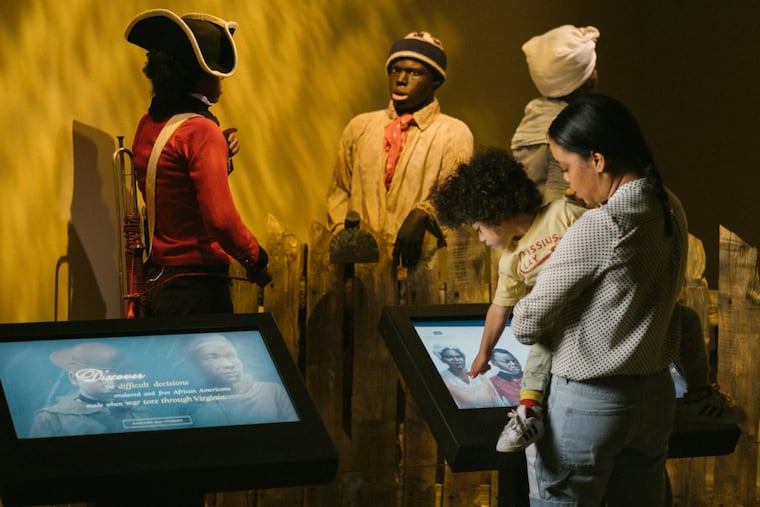Who were the black soldiers of the Revolutionary War?
Men of color who served in the American Revolution were once identified only as groups, not as individuals. But a historian uses pension records, including statements from witnesses, to round out the stories of 500 men in her latest book.

Peter Jennings and Philip Rodman, two free African American men from Rhode Island regiments, were among the Revolutionary War troops who crossed the icy Delaware River on Christmas night 1776.
The ice kept two other generals from making the trip, but it didn't stop the pair's victory: Gen. George Washington was able to capture enemy Hessian forces at Trenton. Two years later, those men's bravery inspired a group of Rhode Island officers to solicit Washington's support at Valley Forge to use enslaved men to fill their state's quota, shorthanded as they were. It worked: The Slave Enlistment Act reimbursed owners for freeing their slaves for the war effort.
The lives of Jennings and Rodman are two of about 500 men of color whose stories are told in historian Judith Van Buskirk's 2017 book Standing in Their Own Light: African American Patriots in the American Revolution.
Van Buskirk, a professor at the State University of New York, Cortland, will talk about the role black men played in the war at the Museum of the American Revolution at 6:30 p.m. Thursday to mark Black History Month.
It's part of what the museum's mission "to cast light on the stories of people who have not traditionally been included in the narrative of the American Revolution and the founding of the nation," said R. Scott Stephenson, vice president of collections, exhibitions and programming.
Roughly 5,000 men of African descent have been documented as serving in the forces of the Continental Army, Stephenson said. Even more — an estimated 20,000 — joined the British war effort; enslaved black men were enticed with promises of freedom.
But it turns out little else was documented about the black men who served in the war, something Van Buskirk discovered after speaking to two veterans at a Fourth of July lecture she gave to an African American community in Mount Vernon, N.Y., in 2002.
On her ride home, she thought about her own Uncle Bud, William Raymond Hendricks, who had joined the Marines at age 16 and served in World War II.
Her uncle survived the Battle of Okinawa but was later killed by a sniper when he was 19. His military records were lost in a fire and her mother had destroyed his letters.
"The forgotten vets, these guys from Mount Vernon, my Uncle Bud — they had put their lives on the line for this country," said Van Buskirk, who took 14 years to research and write the book.
She found most of the histories of the Revolution mention black and American Indian soldiers as groups, rather than individuals. So Van Buskirk went about searching through muster records, which noted when men enlisted in the army and listed their regiments or militias.
Black men were motivated by a number of reasons to join the war: adventure, money, possible freedom. When enslaved men joined the army, "they chose last names that spoke of their new status: Freeman, Freedom, Liberty," Van Buskirk wrote. Those who were already free before the war earned money to purchase the freedom of their wives and children still held in slavery.
They were wagon drivers, servants, fifers and drummers. Some carried muskets and engaged in battles. Most of the black revolutionaries were in New England and southern units; Pennsylvania had relatively few.
After the war, some of those fighting on the British side moved to Canada, especially Nova Scotia, and a few, disappointed in the continued discrimination they endured by white loyalists who also fled to Nova Scotia, resettled in Africa.
Van Buskirk found that pension records painted a more fully developed story of the black soldiers.
In depositions for war pensions, aging veterans had to recount the dates and places where they served and the names of officers they served under.
Often, it was a veteran's widow, children or grandchildren, who gave testimony on what they had heard about the veteran's service. And in many cases, black veterans like William Johnson, who otherwise had no proof they were in the war, found white soldiers or officers to vouch for them.
Johnson, who spent his youth in Boston, where he joined the Third Massachusetts, was 66 when he provided answers for his affidavit for his pension in Vermont in 1822. He said he enlisted in 1781. While he named his officers, he couldn't name any battles, the book recounts.
Without witnesses for his application, Van Buskirk wrote, he "took to the road to find supporters."
That led to the affidavit of William Hull, the lieutenant colonel in Johnson's unit, who noted that although Johnson was in poor health and deaf, he had walked "hundreds of miles" to find him.
Tickets are $15 general admission and $5 for members. Call 215-253-6731.